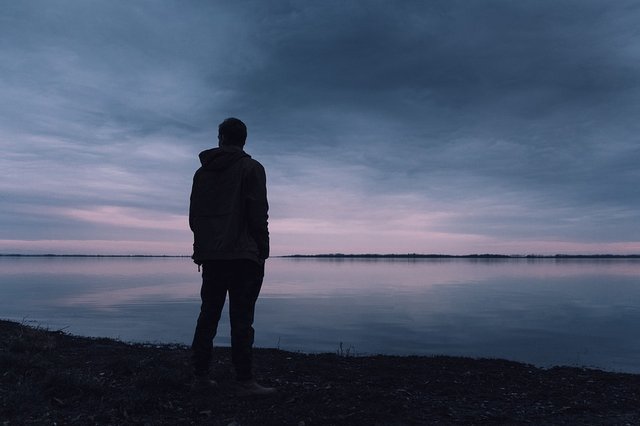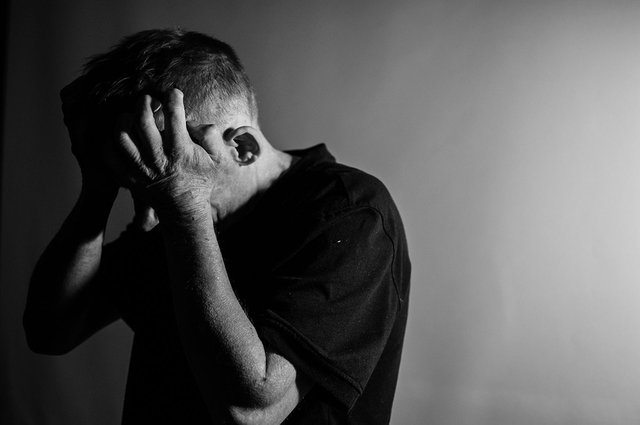
Today I had a really interesting conversation with one of my examinees. I say it's interesting because it is to me as a psychologist but in reallity it was a suffering for that person.
As we met each other he began the conversation with such accuracy and carefully chosen words, that I couldn't fail to notice that something was wrong.
From the his very first word, up until the last he said nothing in disagreement with me. The part which was really interesting is when I started giving him controversial examples and he always agreed.
When I asked him why he is being ambivalent he looked and me with such a shock and shame, like I've just exposed a well hidden secret of his.
He said that he was sorry about that and spoke nothing further. From this moment I knew that this person had incorporated so much the fear of rejection within him, that it had changed his behavior without him even noticing it.
I respected his decision to say nothing further and continued with the procedure.
His behavior really bothered me and I had to share some thoughts with you about it.
Introduction
I’ve heard it many times. Probably you did too. These words that crawl behind your back. The questions you hear when there is nobody around you. They get louder every time you meet new people or engage in social activities: “What are they thinking about me? What if they won’t like or accept me?”
The fear of rejection is maybe the most common obsessive thought which we all have experienced at some point of our everyday life. Nobody is immune to it but some people get used to it and learn to live with it.
But many times that’s not the case.
If we experience a strong obsessive fear of rejection, then we might feel hurt, depressed, emotionally unstable and anxious.
We start avoiding all kinds of close relationships, no matter professional or personal. We become socially isolated and disengaged, which further makes the situation worse.
The fear of rejection is the biggest and most dangerous “killer” of love, friendships, opportunities for success and happiness in our lives.
That’s why it’s important to self-reflect and be very cautious if we recognize it’s domination in our life.

What is in the core of the fear of rejection?
Most people experience the fear of rejection as a painful and devastating experience. Others experience it as “the end of the world”, even though they actually are aware that this is a silly thought, but can’t help it – they become prisoners of their own mind.
In order to avoid experiencing the fear of rejection, people start dressing, eating and living in a way which they think is acceptable by others and will not be judged about. They start following somebody else’s thoughts and ideas, leaving their own behind.
Two strategies which most people apply to overcome the fear of rejection, but actually fall even further in it’s abyss
Being too loving, polite and accurate.
Conforming to the ones around you might sound as a good idea, because you might be thinking that you “can’t go wrong’ and they will always like you. But this is completely false.
By doing this you lose the sense of your personality and true behavior, you become a shadow of yourself, afraid to make a step alone in order to not to anger someone. This way you actually conform to your fear. You've given up.
Being perfect in everything.
“If I dress perfect, do my job perfect and have a perfect communication with others, I could never be judged or rejected”. Again – completely false.
By trying to be perfect the only thing you would achieve is to become even more stressed and anxious. You will become physically and mentally exhausted and if it goes out of hand, your next stop would be a mental institution.
The truth is that there is no perfect defense against the fear of rejection.
How to overcome the fear of rejection?
If you truly experience fear of rejection, it’s highly likely that you are struggling with some personal or professional problems. In most cases the best idea is to find professional help.
If you’ve been isolated for too long, or suffering from severe depression and/or burnout, taking drugs or alcohol to ‘escape reality’, then you must seek help from professionalist.
Psychotherapy as an approach to treat fear of rejection
Probably your psychotherapist would return with you in your past to understand how and why you obtained that low self esteem. For most people it’s impossible to walk this path alone. That’s why you need the help of your therapist
As much knowledge you obtain about yourself and your problem, as easier it would be for you to understand it and to go even further.
The next step could be to understand that you are not a victim and it’s up to yourself to “grab the reins” and decide whether you are valuable or not. You might be surprised if you find out that the “price tag” you wore until this moment was not a product of your own decisions and choices.
During the therapy you should learn how to accept your true self not only in theory but in practice as well. It’s a time-consuming process in which you have to grow and realize the truth about yourself. Somewhere in the future you will stand up, look into the mirror and there you would see a person who no longer experience any fear of being rejected. A free person who walks among other people, communicate and live with them without thinking about whether is going to be liked or not.
It’s a long and thorny road and it’s yours to walk. But remember that you don’t have to do it alone.


Great post! This text covered many reasons for fear of rejection. One more thing can be added: A child who has been rejected by the parents from an early childhood, later in life will be afraid of rejection by other people (friends, partners ...)
Downvoting a post can decrease pending rewards and make it less visible. Common reasons:
Submit
My thoughts exactly - except some children do not have to wait till later in life to suffer the consequences. I work in the foster care system and I see so many young children whose caregivers are having difficulty managing behaviors because they (the children) are victims of early attachment trauma. The issue is so glaring but so hard to correct - especially when you have a caregiver who is not willing to adjust how they respond to the child's behaviors. These behaviors are rooted in further fear of rejection and abandonment which sometimes can become a self-fulfilling prophecy.
Downvoting a post can decrease pending rewards and make it less visible. Common reasons:
Submit
Yeah, that's true! Childhood is in it's root.
Downvoting a post can decrease pending rewards and make it less visible. Common reasons:
Submit
Thank you so much for the job well done! Again, it is only a fool that is prisoner to his own soul. One thing we should know is that, "action cures fears." This is so because whenever the fear of rejection arise, the action you took will be to look for a professional help because you cannot walk that path alone.
Downvoting a post can decrease pending rewards and make it less visible. Common reasons:
Submit
After my girlfriend broke up with me some time last year despite the fact that i did everything to please her, i went out of my way to please her but it just happened that i wasn't good for her. I was so depressed and felt rejected but some how i just had to move on but hadn't opened up to any relationship since then. I think i'm just gonna be my true self and open up to love again.
Thanks for sharing.
Downvoting a post can decrease pending rewards and make it less visible. Common reasons:
Submit
This post has received gratitude of 2.23 % from @appreciator thanks to: @dysfunctional.
Downvoting a post can decrease pending rewards and make it less visible. Common reasons:
Submit